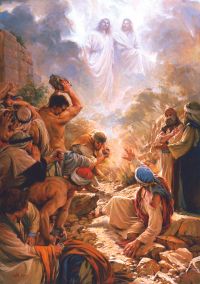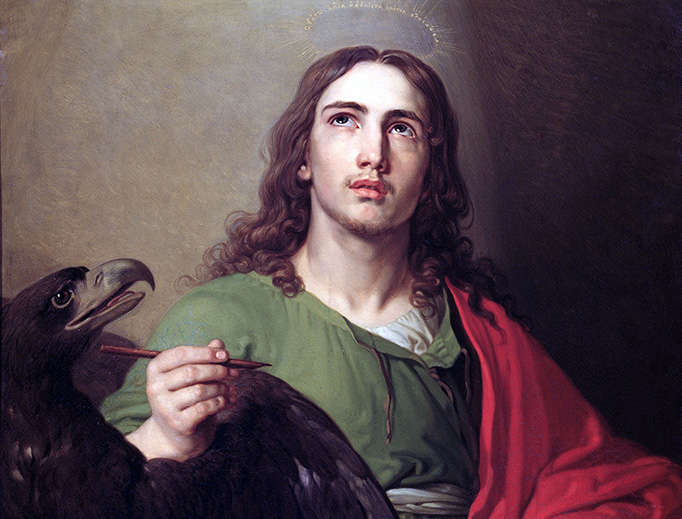To accompany your Come Follow Me study for November 27-December 3
In addition to reading the indicated chapters, you may wish to:
Read the applicable portion of the New Testament Institute Student Manual at:
See the following videos:
If you would like a Kahoot game related to this material which you could use for personal study or use with your family or your class, click here: https://create.kahoot.it/share/1-3-john-jude/6ed0321c-f370-41b5-9a69-d8e2863a2db8 . (To use it with a group, after clicking on this link, you will need to log into Kahoot, creating a free account if you have not done so previously, then click on the blue “Start” button.)
Points to Ponder in 1-3 John and Jude
1. Of what special importance to Latter-day Saints is the knowledge that 1-3 John were probably the last of the biblical books to be written?
2. What is John’s announced purpose for writing 1 John, and how does it relate to the most basic purpose of man’s life, as announced by Lehi? What in this epistle would tend particularly to accomplish John’s announced purpose for writing? (1 John 1:4; 2 Ne. 2:25)
3. What does John mean in 1 John 1:5 when he says, “God is light”?

4. Joseph Smith changed 1 John 2:1 in the JST. What is misleading about the verse as it now stands?
5. Bruce R. McConkie wrote: “As far as the Biblical Dispensation is concerned, this treatise is probably the last recorded inspired writing of which we have record. After it was penned, the long night of apostate darkness descended upon the earth; the heavens were sealed and God no longer communed with men in open vision and by angelic ministration.” (DNTC 3:371-2) What evidence is there in 1 John 2 that John recognized the imminence of the great apostasy–that in fact it had already begun?
6. What can you deduce concerning the religious background of the “antichrists” of whom John speaks in 1 John 2:18-19? Can you put verse 19 into modern English so that it is more readily understandable?
7. What is the “unction” referred to in 1 John 2:20? What does John mean when he says we know all things as a result?
8. What does John say about those who say, “I sure hope the Second Coming doesn’t occur tomorrow”? (1 John 2:28)

9. Many people are offended by the Latter-day Saint teaching that “As God now is, man may be.” Those who feel that way obviously either haven’t heard of, don’t understand, or don’t believe what statement by the apostle John? (Look in 1 John 3.)
10. What erroneous ideas could a person get from reading 1 John 3:6, 8, and 9 as they now stand? (Same with 5:18.) What changes could you make in those verses to make them say what John meant?
11. How serious does John indicate it is to hate another human being? (1 John 3:14)
12. What added word would make 1 John 3:18 better understood?
13. According to John, how can we be sure of getting an answer to all our prayers? (1 John 3:19-24)

14. What does John mean in 1 John 4:2? Almost everyone admits the historicity of Jesus, but certainly that alone doesn’t make them “of God,” does it?
15. Can Latter-day Saints properly call themselves “born again Christians”?
16. What would you say to a person who argued that God cannot have a body of flesh and bones, since the Bible itself indicates that God is simply the great spiritual force we call love? (1 John 4:7, 8)

17. What verse in 1 John 4 is obviously untrue if taken literally? Can you demonstrate one or more biblical verses that it contradicts?
18. What according to John, is the most basic reason that we should love God?
19. Does 1 John 4:18, “perfect love casteth out fear,” mean that if one is apprehensive when he meets a grizzly bear on a trail, he just doesn’t love enough? Explain.

20. Why couldn’t one love God but still hate other humans? (1 John 4:20)
21. What response could you make to one who quoted 1 John 5:7 as evidence that the Father, Son, and Holy Ghost are all the same entity?
22. Can you reword 1 John 5:10 to make it understandable to an 8-year-old?
Possible Answers to Points to Ponder in 1-3 John and Jude
1. Of what special importance to Latter-day Saints is the knowledge that 1-3 John were probably the last of the biblical books to be written?
Revelation 22:18, written by John, is sometimes quoted to argue that there couldn’t be a Book of Mormon or other modern revelation, as it says, “If any man shall add unto these things, God shall add unto him the plagues that are written in this book.” But if John wrote his own epistles and possibly his Gospel of John after writing the book of Revelation, clearly he did not understand the passage that way.
2. What is John’s announced purpose for writing 1 John, and how does it relate to the most basic purpose of man’s life, as announced Lehi? What in this epistle would tend particularly to accomplish John’s announced purpose for writing? (1 John 1:4; 2 Ne. 2:25)
John says, “These things we write unto you, that your joy may be full,” correlating well with Lehi’s declaration that “man is that he might have joy.” John writes much about love, getting answers to prayers, the blessings of the Spirit of God, the reality of Christ’s resurrection, and man’s divine potential, all of which, if properly understood, are sources of incalculable joy.
3. What does John mean in 1 John 1:5 when he says, “God is light”?
I think ChatGPT says it well: “The phrase “God is light” is a metaphorical statement that highlights the character of God as pure, holy, and righteous. Light is often associated with goodness, truth, and purity, while darkness is associated with evil and sin. Therefore, when John says, ‘God is light,’ he is emphasizing the absolute moral purity of God.
“This statement also implies that God is the source of all truth, wisdom, and knowledge. Just as light illuminates and reveals what is hidden in darkness, God’s truth and knowledge reveal what is hidden from us. Additionally, light is often associated with life, and God is the source of all life.
“In summary, John’s statement ‘God is light’ is a metaphorical way of emphasizing the pure, righteous, and holy nature of God, who is the source of all truth, knowledge, and life.”
D&C 88:6-13 expands upon that to teach that Christ (who inherited a fulness of His Father’s glory) is also “the light of the sun, and the power thereof by which it was made,” as well as the power by which the earth, the moon, and the stars were made. “And the light which shineth, which giveth you light,… is the same light that quickeneth your understandings; Which light proceedeth forth from the presence of God to fill the immensity of space– The light which is in all things, which giveth life to all things, which is the by which all things are governed, even the power of God who sitteth upon his throne, who is in the bosom of eternity, who is in the midst of all things.” So physical light and spiritual light are evidently related, and both ultimately come from God.
4. Joseph Smith changed 1 John 2:1 in the JST. What is misleading about the verse as it now stands?
It currently says, “If any man sin, we have an advocate with the Father, Jesus Christ the righteous.” It could appear that there are no strings attached. But Joseph Smith in the JST clarified that this applies only “if any man sin and repent.”
5. Bruce R. McConkie wrote: “As far as the Biblical Dispensation is concerned, this treatise is probably the last recorded inspired writing of which we have record. After it was penned, the long night of apostate darkness descended upon the earth; the heavens were sealed and God no longer communed with men in open vision and by angelic ministration.” (DNTC 3:371-2) What evidence is there in 1 John 2 that John recognized the imminence of the great apostasy–that in fact it had already begun?
In verse 18 he says, “Little children, it is the last time.” He is not speaking of the last time of the earth’s existence, but the last time the Church organized by Jesus Christ would be recognizably His, in view of the many antichrists already at work.
6. What can you deduce concerning the religious background of the “antichrists” of whom John speaks in 1 John 2:18-19? Can you put verse 19 into modern English so that it is more readily understandable?
The Living Bible translation is hard to beat for clarity: “These ‘against-Christ’ people used to be members of our churches, but they never really belonged with us or else they would have stayed. When they left us it proved that they were not of us at all.”
7. What is the “unction” referred to in 1 John 2:20? What does John mean when he says we know all things as a result?
The word “unction” literally means “anointing,” but it seems to be symbolic of the gift of the Holy Ghost, through whom one has access to all knowledge, as need may require.
8. What does John say about those who say, “I sure hope the Second Coming doesn’t occur tomorrow”? (1 John 2:28)
He implies that it is a great lost opportunity, as it is our privilege to so live (“abide in Christ”) as to be able to look forward to His coming with confidence and not fear.
9. Many people are offended by the Latter-day Saint teaching that “As God now is, man may be.” Those who feel that way obviously either haven’t heard of, don’t understand, or don’t believe what statement of the apostle John? (Look in 1 John 3.)
1 John 3:2-3 is one of the great passages of the Bible, teaching clearly that if we have lived rightly, when Christ appears, “we shall be like him.” And other scriptures are clear that Christ is like His Father.
10. What erroneous ideas could a person get from reading 1 John 3:6, 8, and 9 as they now stand? (Same with 5:18.) What changes could you make in those verses to make them say what John meant?
As they stand, the passages could lead someone to worry that if he ever committed even one sin, he was “of the devil,” did not know God, and was not yet born again. Joseph Smith changed all these passages to read “whosoever continueth in sin.” Thus, infrequent sins do not disqualify us. But habitual sins would.
11. How serious does John indicate it is to hate another human being? (1 John 3:14)
John says it is “deadly serious,” as “he that loveth not his brother abideth in death.” The next verse goes on to say, “Whosoever hateth his brother is a murderer: and ye know that no murderer hath eternal life abiding in him.”
12. What added word would make 1 John 3:18 better understood?
The word which Joseph Smith added in the JST: “only,” following the word “tongue.” There is nothing wrong with saying loving words. But there is a lot wrong with doing only that and not coupling our words with loving actions.

13. According to John, how can we be sure of getting an answer to all our prayers? (1 John 3:19-24)
He says we will receive whatsoever we ask, if “we keep his commandments and do those things that are pleasing in his sight.”
14. What does John mean in 1 John 4:2? Almost everyone admits the historicity of Jesus, but certainly that alone doesn’t make them “of God,” does it?
This may have been more true in John’s day than it is in ours. At that time, the Docetics argued that Jesus hadn’t really been here in the flesh, but only seemed to have been. Those, like John, who could testify that He was really here and was literally resurrected were in the minority and were counted as “of God,” or being on God’s side of the argument.
15. Can Latter-day Saints properly call themselves “born again Christians”?
We hope so. John assures us in 1 John 4:7 that “every one that loveth is born of God, and knoweth God.”
16. What would you say to a person who argued that God cannot have a body of flesh and bones, since the Bible itself indicates that God is simply the great spiritual force we call love? (1 John 4:7, 8)
That is not what the Bible says. It says, “God is love,” but it doesn’t say “love is God.” There is a difference. To say God is love is to mean He is the personification of love, that He loves with perfect intensity. There are abundant scriptures to confirm that God is also an individual being of flesh and bones, not merely a spiritual force.
17. What verse in 1 John 4 is obviously untrue if taken literally? Can you demonstrate one or more biblical verses that it contradicts?
Verse 12 tells us that “no man hath seen God at any time.” But Genesis 32:30, Exodus 24:11, and Acts 7:56 are just three of many verses which testify otherwise.

18. What according to John, is the most basic reason that we should love God?
John tells us in 1 John 4:19, “We love him, because he first loved us.” Though we may receive no witness until after the trial of our faith, God does not require us to take the first step regarding love. He first loved us, and the only decent thing for us to do is to reciprocate.
19. Does 1 John 4:18, “perfect love casteth out fear,” mean that if one is apprehensive when he meets a grizzly bear on a trail, he just doesn’t love enough? Explain.
John is obviously not talking about grizzly bears, and it would always be wise to be a bit apprehensive when meeting one on a trail. But if one is filled with the kind of love of which John speaks, he will not really be afraid of death, at the proper time, nor afraid of anything else that man or nature can do to him.
20. Why couldn’t one love God but still hate other humans? (1 John 4:20)
For one thing, other humans are God’s children, and He takes it personally when we mistreat them. “Inasmuch as ye have done it unto one of the least of these, my brethren, ye have done it unto me,” the Savior said.
21. What response could you make to one who quoted 1 John 5:7 as evidence that the Father, Son, and Holy Ghost are all the same entity?
It is worth noting that this verse does not appear in any of the Latin manuscripts of the Bible until the fourth century nor in any of the Greek manuscripts until the sixteenth century. It was evidently added by early Christian scribes in the fourth century, who believed in the Trinity.
However, there are other biblical references to the oneness of the Father and Son, all of which refer to their oneness in purpose and spirit. Jesus thus prayed that His disciples might be one in the very same sense in which He and His Father were one—not one in personage, of course, but united in love and harmony.
22. Can you reword 1 John 5:10 to make it understandable to an 8-year-old?
How about: “If someone truly believes Jesus is the Son of God, the Holy Ghost will tell him that is really true. If he then decides not to believe it after all, it is like calling God a liar, because God, through the Holy Ghost already told him it was so.”
